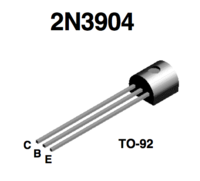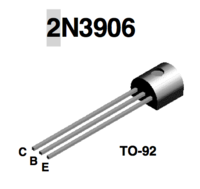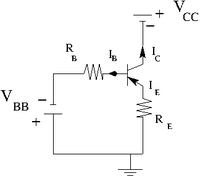Difference between revisions of "TF EIMLab13 Writeup"
| Line 59: | Line 59: | ||
|<math>V_{BB} -V_B</math> || <math>I_B</math> || <math>V_{CC}</math> ||<math> V_ E</math> || <math>I_E</math> | |<math>V_{BB} -V_B</math> || <math>I_B</math> || <math>V_{CC}</math> ||<math> V_ E</math> || <math>I_E</math> | ||
|- | |- | ||
| − | | | + | |V || <math>\mu</math> A || V || mV || mA |
|- | |- | ||
|1.007 || 2|| 0.0704 ||1.2 || | |1.007 || 2|| 0.0704 ||1.2 || | ||
| Line 92: | Line 92: | ||
4.) Repeat the previous measurements for <math>I_B \approx 5 \mbox{ and } 10 \mu</math> A. Remember to keep <math>I_CV_{CE} < P_{max}</math> so the transistor doesn't burn out | 4.) Repeat the previous measurements for <math>I_B \approx 5 \mbox{ and } 10 \mu</math> A. Remember to keep <math>I_CV_{CE} < P_{max}</math> so the transistor doesn't burn out | ||
| + | <math>R_{B} = 201.8 k \Omega</math> | ||
{| border="1" |cellpadding="20" cellspacing="0 | {| border="1" |cellpadding="20" cellspacing="0 | ||
|- | |- | ||
| − | |V_{ | + | |<math>V_{BB} -V_B</math> || <math>I_B</math> || <math>V_{CC}</math> ||<math> V_ E</math> || <math>I_E</math> |
|- | |- | ||
| − | | | + | |V || <math>\mu</math> A || V || mV || mA |
|- | |- | ||
| − | | | + | |1.044 || 5|| 0.094 ||7 || |
|- | |- | ||
| − | | || || || || | + | |1.053 || 5||0.134 ||19 || |
|- | |- | ||
| − | | || || || || | + | |1.026 || 5|| 0.167 || 32|| |
|- | |- | ||
| − | | || || || || | + | |1.003 || 5|| 0.200 || 47|| |
|- | |- | ||
| − | | || || || || | + | |1.003 || 5|| 0.234 ||62 || |
|- | |- | ||
| − | | || || || || | + | |1.02 || 5|| 0.269 ||77 || |
| + | |- | ||
| + | |1.0 || 5|| 0.289 ||83 || | ||
| + | |- | ||
| + | |1.07 || 5|| 0.442 ||101 || | ||
| + | |- | ||
| + | |1.02 || 5|| 0.721 ||99 || | ||
| + | |- | ||
| + | |1.02 || 5|| 1.04 ||100 || | ||
| + | |- | ||
| + | |1.02 || 5|| 1.94 ||100 || | ||
| + | |- | ||
| + | |1.02 || 5|| 2.96 ||101 || | ||
| + | |- | ||
| + | |1.02 || 5|| 3.72 ||102 || | ||
|- | |- | ||
| − | |||
|} | |} | ||
| + | |||
| + | <math>R_{B} = 100 k \Omega</math> | ||
| + | |||
| + | |||
| + | {| border="1" |cellpadding="20" cellspacing="0 | ||
| + | |- | ||
| + | |<math>V_{BB} -V_B</math> || <math>I_B</math> || <math>V_{CC}</math> ||<math> V_ E</math> || <math>I_E</math> | ||
| + | |- | ||
| + | |V || <math>\mu</math> A || V || mV || mA | ||
| + | |- | ||
| + | | || 10|| || || | ||
| + | |- | ||
| + | |} | ||
| + | |||
Revision as of 22:30, 1 April 2015
DC Bipolar Transistor Curves
Data sheet for transistors.
Media:2N3904.pdfMedia:2N3906.pdf
Using 2N3904 is more straight forward in this lab.
Transistor circuit
1.) Identify the type (n-p-n or p-n-p) of transistor you are using and fill in the following specifications.
| Value | Description |
| 40 V | Collector-Base breakdown voltage |
| 6 V | Emitter-Base Breakdown Voltage |
| 40 | Maximum Collector Voltage |
| 200 mA | Maximum Collector Current |
| 625 mW | Transistor Power rating() |
| 30 - 300 | DC current gain |
2.) Construct the circuit below according to the type of transistor you have.
Let .
variable power supply
.
I_B = 2 A = 1V/500 k
- = 5 A = 1V/200 k
- = 10 = 1V/100 k
3.) Measure the emitter current for several values of by changing such that the base current A is constant.
| V | A | V | mV | mA |
| 1.007 | 2 | 0.0704 | 1.2 | |
| 1.05 | 2 | 0.110 | 4.9 | |
| 1.02 | 2 | 0.133 | 8.9 | |
| 1.002 | 2 | 0.162 | 15.7 | |
| 1.002 | 2 | 0.184 | 21.1 | |
| 1.026 | 2 | 0.2287 | 32.3 | |
| 1.012 | 2 | 0.3157 | 39.5 | |
| 1.008 | 2 | 0.484 | 40.0 | |
| 1.008 | 2 | 1.023 | 40.3 | |
| 1.008 | 2 | 2.167 | 40.7 | |
| 1.008 | 2 | 2.960 | 40.8 | |
| 1.008 | 2 | 5.00 | 41.2 | |
4.) Repeat the previous measurements for A. Remember to keep so the transistor doesn't burn out
| V | A | V | mV | mA |
| 1.044 | 5 | 0.094 | 7 | |
| 1.053 | 5 | 0.134 | 19 | |
| 1.026 | 5 | 0.167 | 32 | |
| 1.003 | 5 | 0.200 | 47 | |
| 1.003 | 5 | 0.234 | 62 | |
| 1.02 | 5 | 0.269 | 77 | |
| 1.0 | 5 | 0.289 | 83 | |
| 1.07 | 5 | 0.442 | 101 | |
| 1.02 | 5 | 0.721 | 99 | |
| 1.02 | 5 | 1.04 | 100 | |
| 1.02 | 5 | 1.94 | 100 | |
| 1.02 | 5 | 2.96 | 101 | |
| 1.02 | 5 | 3.72 | 102 |
| V | A | V | mV | mA |
| 10 |
5.) Graph -vs- for each value of and above. (40 pnts)
6.) Overlay points from the transistor's data sheet on the graph in part 5.).(10 pnts)
Questions
- Compare your measured value of or for the transistor to the spec sheet? (10 pnts)
- What is for the transistor?(10 pnts)
- The base must always be more _________(________) than the emitter for a npn (pnp)transistor to conduct I_C.(10 pnts)
- For a transistor to conduct I_C the base-emitter junction must be ___________ biased.(10 pnts)
- For a transistor to conduct I_C the collector-base junction must be ___________ biased.(10 pnts)


